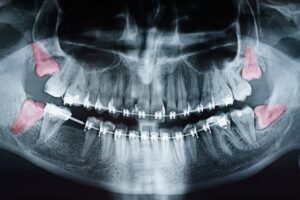
When people hear “wisdom teeth,” they often think of surgery, swelling, and a recovery period filled with ice packs and soft foods. But the truth is, not everyone needs their wisdom teeth removed. Whether or not yours should come out depends on your oral health, jaw size, and how your teeth are growing in. Let’s take a closer look at when wisdom teeth need removal and when they can stay right where they are.
What Are Wisdom Teeth?
Wisdom teeth are the last set of molars, usually appearing between ages 17 and 25. For some people, they erupt without causing any problems. For others, wisdom teeth can lead to crowding, infections, or other dental complications. Because every mouth is different, there isn’t a one-size-fits-all answer.
When Wisdom Teeth Should Come Out
Dentists often recommend removing wisdom teeth in these cases:
- Impaction: If a tooth is trapped under the gum or growing at an angle, it can push against nearby teeth or remain partially erupted, leading to pain and infection.
- Crowding: Many jaws simply don’t have enough space for extra molars, which can cause shifting or misalignment.
- Tooth Damage: Wisdom teeth can press against neighboring molars, wearing down enamel or creating decay.
- Infection Risk: Partially erupted wisdom teeth leave gaps where bacteria thrive, raising the risk of gum disease or abscesses.
- Cysts or Tumors: Though rare, impacted wisdom teeth can cause cysts that damage bone or nearby roots.
In these situations, removal isn’t just a choice—it’s a preventive step to protect your oral health.
When Wisdom Teeth Can Stay
On the other hand, not all wisdom teeth spell trouble. You might not need removal if:
- They grow in fully and align properly.
- They don’t cause pain, swelling, or bite problems.
- You can keep them clean with regular brushing and flossing.
- Your dentist monitors them with X-rays and sees no signs of complications.
If your wisdom teeth are healthy, functional, and not affecting other teeth, you may never need them removed.
Timing Matters
Even if removal is necessary, timing plays a big role. Dentists often suggest extraction in the late teens or early 20s because the roots are not fully developed, and recovery tends to be easier. Waiting until later in life can sometimes make the procedure more complex and recovery longer.
What to Do Next
The only way to know for sure if your wisdom teeth need to come out is to consult your dentist. Through an exam and X-rays, they can evaluate your teeth and determine whether extraction is the best option or if monitoring is all that’s needed.
Not everyone has to get their wisdom teeth removed. While some cases clearly call for extraction, others don’t. The key is personalized dental care. If you’re unsure about your wisdom teeth, schedule a checkup—your dentist can help you make the right decision for your long-term oral health.
About the Author
Dr. Dhiren Ahir brings 20 years of experience in the dental field to the table. He is a graduate of the NYU College of Dentistry and frequently takes ongoing education courses to stay abreast of the latest developments in his profession. He also stays current through memberships in esteemed organizations including the American Dental Association, the Academy of General Dentistry, and the Texas Dental Association. If your wisdom teeth have caused complications, we can help! Schedule your appointment online or call our Denton office at (940) 514-0333.
